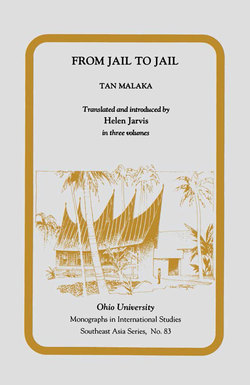Читать книгу From Jail to Jail - Tan Malaka - Страница 14
На сайте Литреса книга снята с продажи.
ОглавлениеINTRODUCTION
[3] Many of my comrades in the struggle, both inside and outside of jail, have long suggested that I write the story of my life. They say that my experiences can be instructive for the present and future heroes of our struggle for independence.
It was only a month or two ago that I agreed to this suggestion. Previously I had seen no possibility to do it. First of all, there was so much other work of far greater importance than portraying my own life, and that work had to be done quickly and with all my attention. Secondly, to write the story of my life spanning over a half a century—a life full of up and down and containing much more down than up—was not a part-time job.1 The final difficulty, of no less importance, was my own situation. My present certain loss of freedom, and my resultant uncertain future, was made even more difficult by my random transfers from place to place, sometimes to places that did not allow me to write at all. Furthermore, I was faced with the possibility that what I wrote later would be seized upon and used against me as the basis of a slander campaign by my enemies, who would not play fair. Considerations such as these initially made me want to leave my own history to history itself.
[4] But when I was assigned a quiet cell in Magelang prison, apart from the other prisoners, and I obtained a pencil, paper, and a table to write on, I thought of writing, if only to fill the time.2 At first I wanted to continue my work on ASLIA, which I had begun in 1942 in Jakarta.3 However, since I had neither a copy of the manuscript itself nor the important statistical material on economic and other matters that was attached to it, I was forced to delay even further this five-year-old project. That is how I was forced into writing these reminiscences.
This is not a life history in the strict sense of the usual chronology from childhood to adulthood, from schooldays to the time of social employment, such as is generally indicated in the title Life and Work. But I write nothing that is not based on fact and not part of the history of my life.
What I write here can later be compared with reality, and historians can see if anything was left out or added. Some of those people whose names I mention can be traced and questioned by those who wish to do so. If my story doesn’t tally exactly with the truth, it is the result of human error or memory rather than design.
What I write here is only a part of my life story. But it is a part I consider not to be less important because of its close connection with my efforts to realize the desire for independence in both the political and economic sense. I focus this story on several prisons, and so I shall describe the events surrounding each of these prison episodes.
Thus I tell the story of what happened before, during, and after my imprisonment in the Dutch East Indies, the Philippines, Hong Kong, and the Republic of Indonesia. Perhaps this work will be divided into two volumes. If so, then the first volume will deal only with the prisons of the Dutch East Indies and the Philippines.4
It is obvious that my efforts to fulfill the duty of demanding independence—both for the people of Indonesia as a whole and for myself—were opposed by Dutch, American, and British imperialism. This neither surprised nor disappointed me. On the contrary, I felt happy to see that international imperialism regarded the struggles of the Indonesian people as significant. I believe that once all these obstacles are overturned and 100 percent independence is achieved, the security, prosperity, and happiness of the independent Indonesian people will be guaranteed. All the physical and spiritual forces awakened and used in overcoming these obstacles will take new forms and become forces of development and preservation. The more these forces are required and utilized, the firmer will be the future of the Indonesian people.
[5] I have entitled this book From Jail to Jail, and I believe that there is a relationship between jail and genuine freedom. Those who really want freedom for all must be ready and willing at every moment to suffer “the loss of their own freedom.”
Whoever wishes to be free must be ready to be jailed.5
Tan Malaka
Ponorogo prison6
September 1947
